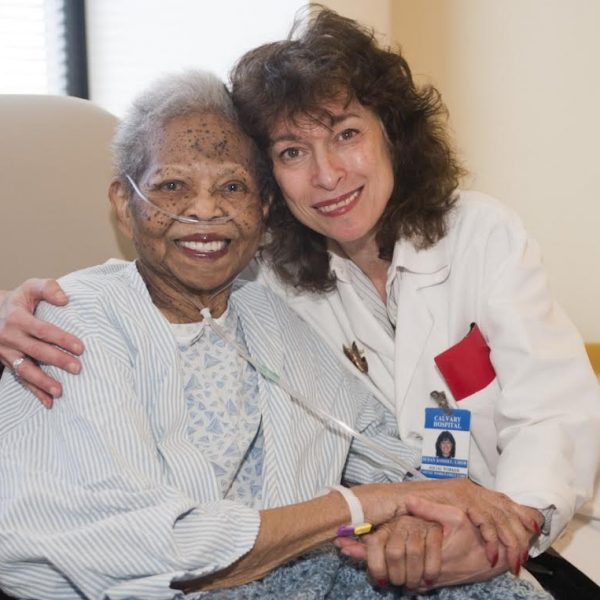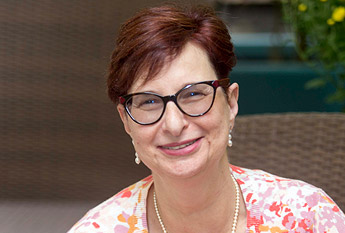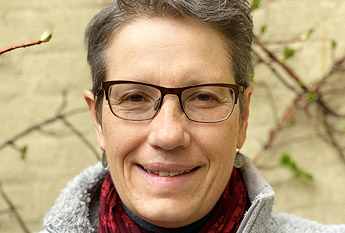Celebrating Social Work Month 2020: “Generations Strong”
Celebrated each March in the United States, National Professional Social Workers Month offers us an opportunity to spotlight the extraordinary people who serve in this essential helping profession. The 2020 theme, “Generations Strong,” refers to generations of social workers who have made a difference in the lives of millions of people.
Today, Social workers serve a variety of roles in varied settings. Medical social workers assess patient and family situations and consult with other healthcare workers to provide the best services, care, and comfort for patients and support services for family members.
Social Workers at Calvary
Social workers at Calvary Hospital and Calvary@Home have a different role than those in most healthcare settings. In most hospitals, social workers help patients transition to their next level of care. At Calvary, our social workers are integral to the caregiving team, providing support and comfort to both patients and families. It is why our inpatient social workers are called family care practitioners, and why our home hospice patients and families become so close to their assigned social workers.
It is also why we have dedicated our Family Care Center (FCC) at the Bronx Campus and facilities at The Dawn Greene Hospice and Ozanam Hall where family members can find quiet, soothing spaces allowing them a few moments of respite from the patient rooms.
“Social workers and family care practitioners – as we call our inpatient social workers – are key members of our care teams because of Calvary’s special mission of caring for people who are facing the end of life. We meet patients and families at one of life’s most stressful and difficult moments,” explained Debbie Feldman, JD, LCSW-R, Administrator, Family Care Services.
By the time patients are referred to Calvary, they may be exhausted by navigating various healthcare facilities and insurance coverage. Our social workers cannot change the patient/family situation, but they can listen and help overwhelmed family members sort out priorities and find resources for additional assistance.

Support Groups and Special Services at Calvary Hospital
At Calvary, a variety of services are available to family members. The Family Care Center, which is located at Calvary’s Bronx campus, is a place where families may receive supportive counseling services and relieve stress through relaxation services including manicures, yoga, guided meditation and pet therapy.
“A distraught young wife and mother came to the Family Care Center recently,” says Stephanie Mastropaolo, LMSW, Coordinator of the FCC. “Her husband, who was nearing the end of life, was the family’s principal wage-earner, and she was concerned about their children, their home, and her own small business. I was able to listen to her and provide her the support she needed, letting her know that her feelings of worry and fear are valid.
“In the end, she left the Family Care Center feeling calmer and with a sense of some concrete things she could do to help herself and her children move forward, while still caring for her husband. I am thankful that Calvary gives its social workers the time it takes to provide this kind of counseling and support for those in our care.”
Life-limiting illness is very stressful for both patients and their families. Having support and guidance through the process, often from our social work staff, is one of the reasons Calvary Hospital is so appreciated by our patients and families.

Missy Cohen’s husband, Peter, was cared for at Calvary’s Bronx campus for 4 months. “As soon as I would walk into the Family Care Center, Stephanie was always there for me. Calvary’s Social Work team played a big part in my healing process. I will be grateful to them forever.”
Caring for Home Hospice Patients
While the practice of social work for our home hospice patients is similar to the care we provide for our inpatients, it differs in some important ways. Perhaps most significant, social workers often have a longer time to get to know their patients – the average length of stay for home hospice is 40 days, as opposed to 28 days for inpatients – and fewer than ten days for patients cared for at The Dawn Greene Hospice and Ozanam Hall.
Social workers often meet patients at an earlier stage of illness than is true for inpatients, which means that patients are often able to communicate with the social worker. It is not unusual for patients to develop a close, trusting relationship with our social workers. They often will share precious memories and wishes for their end-of-life care, and even their funeral and burial wishes. The longer time frame also gives the social worker the opportunity to prepare families for what to expect as illness progresses. Home hospice requires a partnership between the family and friends who are responsible for most of the care and the hospice team. In some cases, the patient’s caregivers may not be able to provide a safe, nurturing environment.
“There is no safety net,” says Linda Morellino, LMSW, ACHP-SW, Strategic Relationship Manager for Calvary@Home. “Our social workers are often tasked with identifying and putting into place resources aimed at helping the patient and family to better cope, and to provide support for families as the patient transitions.”
Calvary Social Workers
 Karen Wilkow, LCSW, ACHP-SW
Karen Wilkow, LCSW, ACHP-SW
Brooklyn Campus
“There isn’t a day that goes by that I don’t feel honored to work with patients and their families at such an intimate time in their lives. Most people I have cared for and worked with have a special place in my heart.”
Read more
 Juliet Sternberg, LMSW, Calvary@Home
Juliet Sternberg, LMSW, Calvary@Home
“What sets Calvary apart is the glorious lack of a cookie-cutter approach to palliative care, that each person is treated according to their individual needs. I love that about us!”
Read more
Categories
Archives
- November 2025
- October 2025
- September 2025
- August 2025
- June 2025
- May 2025
- April 2025
- March 2025
- February 2025
- October 2024
- August 2024
- July 2024
- May 2024
- April 2024
- March 2024
- February 2024
- December 2023
- November 2023
- October 2023
- August 2023
- July 2023
- June 2023
- May 2023
- April 2023
- March 2023
- January 2023
- December 2022
- October 2022
- August 2022
- July 2022
- June 2022
- April 2022
- March 2022
- February 2022
- January 2022
- October 2021
- September 2021
- August 2021
- July 2021
- June 2021
- May 2021
- April 2021
- March 2021
- February 2021
- December 2020
- November 2020
- October 2020
- September 2020
- August 2020
- July 2020
- May 2020
- April 2020
- March 2020
- February 2020
- January 2020
- December 2019
- November 2019
- October 2019
- September 2019
- August 2019
- July 2019
- May 2019
- April 2019
- March 2019
- February 2019
- January 2019
- December 2018
- November 2018
- October 2018
- September 2018
- August 2018
- July 2018
- June 2018
- May 2018
- April 2018
- December 2017
- November 2017
- October 2017
- September 2017
- August 2017
- July 2017
- June 2017
- May 2017
- April 2017
- April 2012

